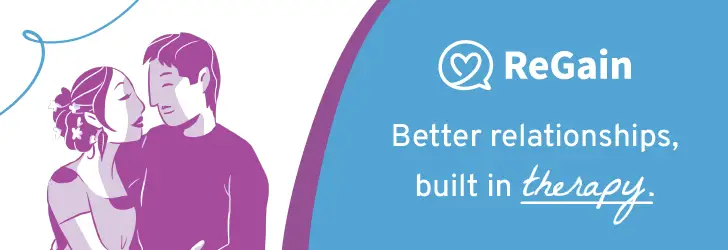As a BetterHelp affiliate, we receive compensation from BetterHelp if you purchase products or services through the links provided
Cheating before marriage is a controversial topic that stirs various emotions and debates. While some individuals may consider it a moral dilemma, others might see it as an opportunity to clarify their feelings and desires before committing their life to someone. Either way, it is crucial to understand the concept of cheating and adultery and whether or not engaging in such actions before marriage falls under that category.
To grasp the complexities of this issue, it is essential to comprehend the psychological factors and the potential consequences of cheating in a relationship before marriage. By delving into these actions’ emotional impact and possible outcomes, you can make informed decisions regarding your relationship and navigate the path toward a healthy and fulfilling partnership.
Key Takeaways
- Understanding the definition and implications of cheating can help you navigate your relationships more effectively.
- Psychological factors and emotional impact play a significant role in deciding to cheat before marriage.
- Awareness of the potential consequences and therapeutic measures can foster growth and healing in your relationship.
 Understanding the Concept of Cheating and Adultery
Understanding the Concept of Cheating and Adultery
While many people might use the terms cheating and adultery interchangeably, it is essential to understand that they represent different aspects of unfaithfulness in a relationship. Cheating refers to any breach of trust or betrayal in a relationship, whereas adultery pertains to sexual relations outside of a marriage.
In the context of a committed relationship, cheating can take various forms; it is not always about having a sexual affair. Cheating can include emotional affairs, flirting, sexting, or even forming close friendships that replace the partner’s role. Cheaters may try to keep their actions private, sometimes dismissing their behavior as harmless fun or innocent friendships. Establishing boundaries and openly communicating with your partner is essential to determine what constitutes cheating in your relationship.
Adultery, on the other hand, is traditionally defined as engaging in sexual intercourse with someone other than your spouse while you are married. This specific form of cheating holds significant legal and cultural implications in many societies. Adultery can be cited as grounds for divorce and, in some countries, may also be punishable by law. For many, adultery represents a severe violation of trust and commitment in a marriage.
Relationship experts often stress the importance of trust and communication in maintaining a healthy partnership. An emotional or physical affair can severely damage or break that trust. Infidelity, in any form, involves deception and betrayal – a person in a committed relationship choosing to act on desires outside of their partnership, often at the expense of their partner’s feelings and the relationship itself.
In the face of infidelity, it is important to remember that healing from cheating is a process, and it may take time for both partners to rebuild trust and reestablish a sense of security in the relationship. Whether emotional or physical, cheating remains a powerful issue in many relationships, and understanding its complexities is essential for creating healthy boundaries, open communication, and, ultimately, a strong and fulfilling union.
 Impact of Cheating on Relationship Before Marriage
Impact of Cheating on Relationship Before Marriage
Cheating before marriage can drastically affect the dynamics of your relationship, both for you and your partner. Cheating can erode the emotional connection and undermine the trust that forms the foundation of a committed and loving partnership.
The affection between you and your partner will likely suffer, as acts of betrayal can create an environment where intimacy is compromised. The seeds of doubt in your partner’s mind may fester, leading to a loss of trust and diminishing your affection.
As dissatisfaction grows, the once-monogamous relationship may become strained, with both partners feeling on edge and questioning their future together. Cheating will likely make it more difficult for you both to enjoy the exclusivity typically experienced in a committed relationship.
Maintaining open communication is vital to overcoming the negative impact of cheating before marriage. Both partners must be willing to address the underlying issues and work together to build trust and restore the emotional connection.
Being honest with yourself and your partner will be crucial to healing. Reaffirming your commitment to one another and expressing genuine remorse for your actions can help mend the wounds caused by cheating. Additionally, focusing on positive aspects of your relationship, such as shared values, interests, and goals, can strengthen your bond and enable you to move forward together.
Psychological Factors Behind Cheating
When considering the reasons behind cheating before marriage, it’s essential to understand the psychological factors involved. Your feelings, such as anger and guilt, can significantly affect this behavior. Examining how your self-esteem, commitment, and choice interact with these feelings is crucial.
Cheating often stems from unmet emotional needs or dissatisfaction within a relationship. You may seek validation and excitement outside your relationship due to low self-esteem or a lack of commitment. By recognizing these issues, You can start addressing them and develop healthier relationship patterns.
If you struggle with anger, guilt, or blame, it might affect your decisions and actions. Cheating can be an outlet to cope with these emotions, but it often intensifies them, leading to a destructive cycle that damages trust between you and your partner.
Addiction is another crucial factor to consider. Some people may have a compulsive tendency toward infidelity, which makes it challenging to resist temptation and remain faithful. By acknowledging a potential addiction, you can seek professional help and work towards overcoming it.
In summary, various psychological factors contribute to cheating before marriage, such as emotions like anger and guilt, self-esteem issues, commitment levels, and addiction. Understanding these factors can provide insight into your behavior and help you work towards a healthier, more honest relationship.

Consequences of Cheating: From Pain to Divorce
When you cheat before marriage, you set the stage for negative consequences that can affect you and your partner. The most immediate impact is the intense emotional pain experienced by the betrayed individual. Trust is shattered, leading to insecurities and doubts about the entire relationship, making it difficult to rebuild what was once a solid foundation.
As feelings of betrayal linger, the emotional and mental turmoil can wear down both partners. Communication becomes strained, and resentment festers, creating a widening rift. This often leads to arguments and conflicts, further eroding your bond.
Should the relationship have children involved, the fallout can be particularly devastating. The pain and turmoil triggered by cheating will inevitably ripple through the family, impacting the emotional well-being of your children. Witnessing the turmoil between their parents can lead to insecurity, anxiety, and long-term emotional issues that persist well into adulthood.
In many cases, the cumulative damage caused by cheating ultimately leads to divorce. Ending a relationship is never easy, but when it’s triggered by infidelity, it can be particularly fraught with bitterness, anger, and guilt. Separating can be long and painful, especially when dividing assets and negotiating custody arrangements.
While it may be tempting to dismiss the impact of cheating before marriage as a minor transgression, the reality is that the consequences can be long-lasting and far-reaching. By understanding the potential results of infidelity, you can make more informed decisions about your actions and their repercussions on your personal and family life.
Therapeutic Measures for Healing
It’s natural to feel hurt and betrayed when you discover your partner cheated before marriage. However, for the healing process to begin, you must take some steps forward. Here are some therapeutic measures to help you and your partner rebuild trust and move forward.
Engage in Therapy or Counseling: Attending therapy sessions with a trained professional can provide a safe space for you and your partner to express your feelings and emotions. Couples therapy or individual counseling can help you learn effective communication skills, explore the underlying issues that led to infidelity, and develop healthier relationship patterns.
Show Remorse: Your partner should genuinely apologize for their actions, expressing true regret for the hurt they have caused. This is the first step toward rebuilding trust. They must acknowledge their mistakes, take responsibility, and commit to making amends.
Cultivate Forgiveness: While forgiving someone who has cheated is not easy, it is essential for healing. Work on letting go of negative emotions and focus on the present. Remember that forgiveness is not about condoning the behavior; it’s about releasing yourself from bitterness and resentment.
Rebuild Trust: Regaining trust takes time and commitment from both partners. Your partner must consistently strive to change and rebuild the lost trust. This may include open communication, transparency in their daily activities, and regular check-ins.
In conclusion, healing from infidelity before marriage is a process that requires patience, understanding, and commitment from both partners. By following these therapeutic measures, you can work together to rebuild trust and create a stronger, healthier foundation for your future together.
 Preventive Measures Against Cheating
Preventive Measures Against Cheating
Building a strong and happy relationship requires effort from both partners. To prevent cheating in your relationship, you and your partner must promote a sense of respect, trust, and responsibility. Here are some friendly suggestions to help you maintain faithfulness and truth in your relationship.
Developing a foundation of trust and mutual respect is crucial. Ensure you are open and honest with your partner about your feelings, needs, and expectations. Listening to their perspective with empathy and understanding promotes a strong foundation of trust in the relationship.
Practicing open communication is another critical aspect. You should be open about your emotions and regularly discuss daily events, future goals, and concerns. This constant dialogue encourages you and your partner to understand each other better, thus preventing feelings of isolation or detachment that may lead to infidelity.
Establishing clear boundaries and expectations about monogamy and exclusivity in the relationship is also essential. This means discussing what behaviors are acceptable and unacceptable. Doing so will help you and your partner maintain a sense of sexual exclusivity and emotional security, as both partners will understand their responsibilities.
Sharing hobbies and interests and spending quality time together can strengthen the bond between you and your partner. This shared time helps to grow trust and create cherished memories. In addition, celebrating each other’s successes and offering support during challenging times can further solidify your bond.
Lastly, nourishing the emotional and physical intimacy in your relationship is vital. Offer support, encouragement, and frequent reassurance of your love and commitment to one another. Demonstrating affection and attention shows that you prioritize the relationship, reinforcing its emotional strength and stability.
Following these preventive measures and working together as a team can help foster a faithful, truthful, and long-lasting relationship. Remember, staying committed to open communication, trust, and responsibility is the key to maintaining exclusivity and happiness in your partnership.
 Cheating in the Age of the Internet
Cheating in the Age of the Internet
In today’s digital age, cheating in relationships has expanded beyond physical encounters. Your online relationships can also play a role in determining fidelity. As accessibility to various platforms grows exponentially, the potential for infidelity also rises.
Not every online relationship is considered cheating, but things become murky when intimate feelings and emotional attachments come into play. As a result, your suspicions toward your cheating spouse can be accentuated by their activities online. The opportunity to stray is far greater because of the internet’s anonymity and ease.
When trying to make sense of cheating in the internet age, keep the concept of “MC” – Moral Compass – in mind. Your moral compass guides your decisions and actions, indicating whether a behavior is acceptable. Examine your moral compass in online relationships and gauge your partner’s actions and intentions.
Establishing boundaries and open communication with your partner is crucial to avoid misunderstandings and distrust. Tackling infidelity, whether online or offline, requires empathy, understanding, and a willingness to work through any issues together.
Remember to trust your instincts and listen to your emotions because they can provide vital insights into your relationship’s health. Navigating the digital world and maintaining a faithful union may be challenging, but honesty and respect will create a strong foundation for your love to thrive.
Frequently Asked Questions
Is infidelity before marriage also considered adultery?
Yes, infidelity before marriage can be considered a form of adultery. Although “adultery” is often associated with married individuals, the underlying concept is the same: being unfaithful to your partner. Cheating on your partner before marriage might not fit the standard legal definition of adultery, but it’s still a breach of trust and fidelity in the relationship.
What does the Bible say about being unfaithful before getting married?
The Bible addresses the topics of adultery and sexual immorality, but it does not specifically mention premarital infidelity. However, biblical principles emphasize the importance of faithfulness and commitment in any relationship, and premarital cheating goes against those values. For instance, the Ten Commandments include the command not to commit adultery (Exodus 20:14), and 1 Corinthians 6:18-20 encourages Christians to flee sexual immorality.
How does premarital cheating differ from adultery?
While being unfaithful might be similar, the main distinction between premarital cheating and adultery is the legal and social status of the individuals involved. Adultery typically refers to married individuals engaging in extramarital affairs, while premarital cheating involves individuals who have not yet entered a legal marriage. The consequences and stigma attached to adultery are generally more severe than those related to premarital cheating. Still, both actions can cause emotional pain and lead to the erosion of trust in a relationship.
Are there consequences for cheating on a partner before marriage?
Yes, there can be consequences for cheating on a partner before marriage. These might not be legal consequences, but they can include emotional repercussions, damaged trust, and potentially the end of the relationship. A partner who feels betrayed by premarital infidelity might struggle to trust their significant other in the future, and this lack of trust can impact the stability and success of the relationship.
How does one define adultery and cheating in a relationship?
Adultery is a voluntary sexual relationship between a married person and someone other than their spouse. On the other hand, cheating in a relationship is a broader term that encompasses any breach of trust or violation of the expectations and boundaries set within a relationship, whether married or not. This can include physical, emotional, or virtual infidelity. Ultimately, how one defines adultery and cheating may vary depending on personal beliefs, cultural norms, and the unique context of one’s relationship.
Do biblical teachings address premarital infidelity?
While the Bible does not explicitly discuss premarital infidelity, various passages emphasize the importance of fidelity and commitment in relationships. Scripture teaches that relationships should be built on trust, respect, and mutual understanding (Ephesians 5:21-33; Colossians 3:18-19). These principles can be applied to married and unmarried couples, implying that premarital infidelity contradicts biblical teachings on love and commitment.
 Healing the Cracks: When Therapy is the Answer
Healing the Cracks: When Therapy is the Answer
Cheating before marriage can leave deep emotional scars and mistrust that lingers, potentially disrupting the foundation of the relationship. This fracture may lead to a complicated and painful journey where therapy becomes viable. But how do you know when professional assistance is needed, and what signs point towards progress in therapy? Here’s a closer look:
Signs Therapy is Needed:
- Persistent Trust Issues: If trust cannot be rebuilt within the relationship, it may be time to seek professional help.
- Communication Breakdown: A lack of open and honest communication could signal the need for therapeutic intervention.
- Emotional Distress: Feelings of anxiety, depression, or anger that persist may indicate underlying issues that require professional care.
Goals in Therapy:
- Rebuilding Trust: Developing trust is paramount, and therapy can facilitate this process through open dialogue and mutual understanding.
- Understanding Motivations: Delving into the reasons behind the cheating can lead to healing and prevent recurrence.
- Enhancing Communication: Therapy often focuses on enhancing communication skills, allowing both partners to express feelings and needs openly.
Signs of Progress in Therapy:
- Improved Communication: Noticeable changes in how partners communicate, listen, and empathize.
- Growing Trust: A renewed sense of trust and commitment to the relationship.
- Emotional Stability: A decrease in emotional turmoil and the development of coping strategies for both partners.
Therapy is not a one-size-fits-all solution, but it can be a powerful tool in rebuilding a relationship marred by cheating. By recognizing when therapy is needed and understanding the signs of progress, couples can make informed decisions on their path toward healing and growth.
Move beyond pain and confusion together.
 From Battlefields to Bridges: My Journey Through Mental Health and Legal Labyrinths
From Battlefields to Bridges: My Journey Through Mental Health and Legal Labyrinths
Hello, I’m Jacob Maslow, and my life’s journey has been anything but ordinary. I’m a therapy veteran who takes Lexapro to manage my mental health. My days are often spent taking long walks to clear my head – a routine therapy that allows me to reflect on life’s complexities.
My experience with narcissism is deeply personal, driven by my ex’s severe narcissism that led her to chase community leaders for affairs and break court orders. Her refusal to cooperate with court-ordered shared custody has resulted in an ongoing court battle and a barrier between me and my two minor children, with whom I once shared a close relationship.
These painful experiences have shaped my understanding of mental health and legal struggles and inspired me to channel my insights into helping others. I write about mental health and narcissism, sharing my perspective and supporting those dealing with similar challenges.
Moreover, I run a legal site assisting others facing non-compliance with court orders and weaponized parenting from their spouses. My story is a testament to resilience, a message of hope that anyone can overcome mental health issues and navigate the intricate maze of legal battles.
In my writing, walk, and work, I believe in building bridges from the battlefields of personal struggles to the realms of healing and empowerment. Join me as we explore these paths together.
- How to Transform a Home’s Patio Space into a Relaxing Space - March 23, 2025
- 5 Strategies to Use a Cell Phone to Help Manage Your Stress - March 23, 2025
- 4 Ways to Use Measurements to Create a Relaxing Sleep Space - March 23, 2025
This site contains affiliate links to products. We will receive a commission for purchases made through these links.


 Understanding the Concept of Cheating and Adultery
Understanding the Concept of Cheating and Adultery Impact of Cheating on Relationship Before Marriage
Impact of Cheating on Relationship Before Marriage
 Preventive Measures Against Cheating
Preventive Measures Against Cheating Cheating in the Age of the Internet
Cheating in the Age of the Internet Healing the Cracks: When Therapy is the Answer
Healing the Cracks: When Therapy is the Answer
 From Battlefields to Bridges: My Journey Through Mental Health and Legal Labyrinths
From Battlefields to Bridges: My Journey Through Mental Health and Legal Labyrinths
